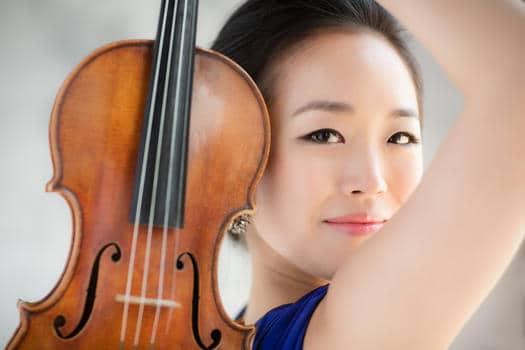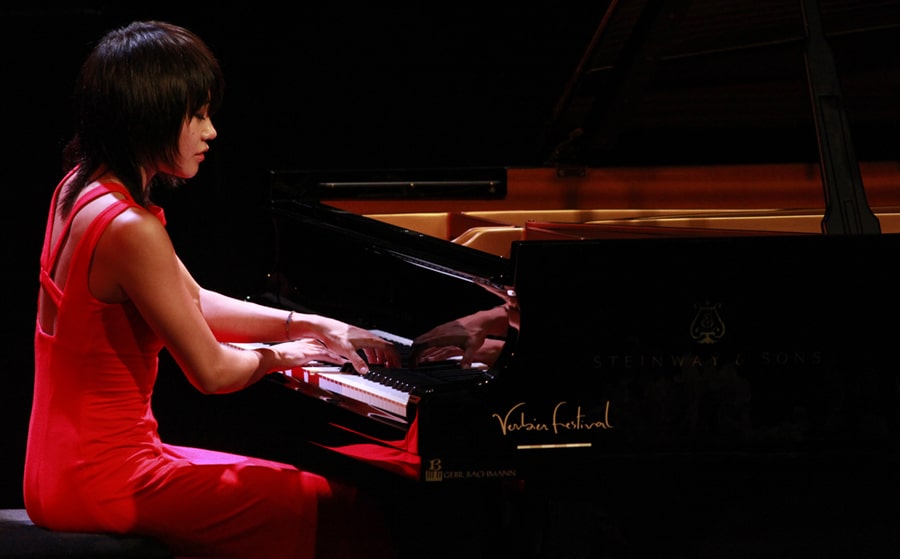Percussionist catches a bad case of The Clap
mainColin Currie is in distress. Every time he reaches the closing pages of Stockhausen’s Kontake, some idiot in the audience starts the applause. Too soon. Colin is fuming. If words could kill, he’s written them. Here. Read.






Ah yes, I see he’s encountered The-One-Who-Must-Clap-The-Instant-The-Music-Is-Finished (though in this case it seems there was a case of premature appreciation)
At Leeds Town Hall, ON’s Reingold, I sat next to The One. He was quite thin and mean-looking and wore tweeds, shiny shoes, and an impatient look. I was afraid to move about too much as I thought he was just a normal concert-fascist and I don’t deal at all well with glares, tuts and suchlike.
Anyway, approaching the ecstatic final bars and I’m relieved at having successfully not incurred this chap’s wrath despite my legs practically falling off with cramp, and The One, after being tautly immobile for the past 3 hours (in the same way that a spider is tautly immobile) starts quivering. Yes, quivering! I couldn’t work out why, but precisely 1 nanosecond after the final barline was reached he leapt up and started clapping as if his life depended on it.
No pondering the journey into Valhalla for me! No contemplative wonder at the Rainbow! Instead I had to apologise to my neighbour on the other side as I’d been tipped over onto him by The Clapping One.
I’m not sure what to do about The Clapping One and his friends but making them listen to Stockhausen sounds like a good start. Or perhaps an endless performance of Reich’s “Clapping Music”?
Clapping Music? Naah, he’d just join in and mess up the rhythms (though he’s never, ever admit it).
I think his hell should be endless repeats of the Tchaikovsky 6th, with everyone else around him leaping to their feet after the third movement as he helplessly protests that it’s the wrong place and the piece isn’t over yet.
Last year in Leeds I heard a conductor talking about how to manage the Tchaikovsky 6th and transition into the final movement without people launching into premature applause. His solution was to have almost no space between the movements, and this worked. In the case of the maddening clappers mentioned here, could the performer hold up his hand in the ‘don’t’ position, or even mention it before starting the whole piece.
Colin, if you want people to read your blog you might think about about changing the colors of your blog.
The white letters on the black background is worse than “The Clap.”
I was at both these events: Kontakte (QEH last Sat) and Gruppen (Proms 2008) and the phantom applauder was very obstructive. Nobody would surely do that at the end of Mahler IX !!
I was there. To say the lone clapper ‘destroyed’ the work is I think a slight exaggeration. Yes, we could have done without it, but today we have to deal with all sorts of extraneous noise, some much more irritating than this.
This is an ever-increasing problem with audiences, this clapping business. An unnecessary desire of the audience to contribute to the performance in an effort to exert their interest and, dare I say, a pretentious act to let others know that they are knowledgeable of the works performed. It’s nothing more than a too-too gesture that tells the performers their work is incomplete without the help of the listener – audience-participation is inevitable.
No place is this more practiced than in Minnesota. The countless number of concerts I’ve been to in this state has been a string of embarrassments as we share the same halls and auditoriums with the likes of Alfred Brendel, Miles Davis, Ravi Shankar and many more.
I sympathise with Mr. Currie.
Are you by any chance Charles Olsen, the baton maker?
‘A cough or a baby crying will not ruin a good piece of modern music’ (John Cage). Presumably that goes for a stray clap as well.
LOL!
It’s sadly not that new a phenomenon. I was at a performance of Sibelius 5th symphony in Symphony Hall, Birmingham – probably around the mid-90s. As a recent student, I was in the chorus seats, facing the conductor from behind the timps. No sooner had the final two chords sounded than the “lone clapper” jumped to his feet in the circle – yelled “Bravo” at the top of his voice, and clapped wildly. Maybe it was projecting on my part, but I’m sure I read expressions of “God, not another one of those” on several of the orchestra members.
Oh, I forgot! Going to a concert is to be a reverential experience, a hushed encounter with the divine in which the only form of engagement the audience is allowed is closing one’s eyes and contemplating the inner structure of the melody and countermelody, and the clever use of cadences that pivot on the third. Clapping at the wrong time is the greatest offense known to man. And as we all know, the appropriate clapping procedure for each piece in the repertoire is something intelligent people inherit at birth. If only there were a way to keep uncultured people out of the concert hall! That way we could have a smaller but purer congregation, like the Catholic Church. But unfortunately, as we all know, all the concert halls in the US and Europe are simply packed every single night with first-timers, teenagers and college students, and rock-and-roll lovers seeking a new experience, and they are ruining it for everyone else.
I had no idea Colin Currie was such a prig. He seems so nice.
Oh come now. You’re confusing the newcomer who doesn’t know the drill with the pretentious “clapping Johnnies” (or whatever you want to call them) who want to show something – their appreciation, their own sense of sophistication? – milliseconds before everyone else. People pay to hear the performer(s) and music, not the clapper. For the same reason I also don’t want to hear a fellow audience member humming along to the music during a concert.
I’ve been to any number of performances – especially of Wagner operas – whose end has been marred by some moron(s) starting to applaud before the final chord has even died away. It’s not reverence, or knowing the code that commands this should not happen; it’s courtesy to your fellow listeners. And if you don’t know the protocol? Do what you would do anywhere else when you’re in unfamiliar surroundings: Wait until you see what everyone else is doing.
Did you actually read Currie’s piece? I guess not.
Let me explain: the clapping wasn’t of the ‘after the first movement’ variety. It was of the ‘completely ruining the effect of a piece ending quietly’ sort.
You know: the one which makes the previous umpteen minutes of a piece almost pointless, because the vulgar and insensitive intrusion the very second the piece has finished – or before the piece has finished, in some cases – destroys the atmosphere and mood of the piece.
Oh I certainly read it. I especially liked the way he projected all kinds of motives onto the clapper.
In the interests of balance I must say that at this concert (Saturday, QEH) the very opposite also happened in that the performers spoiled things for the audience !!
The first work was the tape masterpiece Gesang der Junglinge and it was started with indecent haste when the audience wasn’t quite ready. The tannoy stuffed shirt had told us to turn our mobiles off and – whilst people were fiddling with their phones – the music started almost immediately.
Very bad move ! Stockhausen would never have done this. He liked long pauses to focus people’s attention.
If Colin Currie is reading – please have a word with your technicians 😉
This spoiled an otherwise great concert.
I’ve always apprreciated a live performance for its musical tactility and for how music inhabits acoustic space. I’m suspicious that most composers and not a few musicians are likewise fascinated. There are many fragile moments where these spaces are so intense and precise that they resonate inside us like some sort of huge balancing.
And to miss that, to feel that because something is at the edge of perceptible, it isn’t there, is to destroy the music- not just that moment in the music but the whole of the music because it is contextual and inhabits this beautiful welcoming soundscape.
I don’t know where ear training must start, but it must.
I sincerely hope that Mr. Currie can make this work, but unfortunately, one can not “un-hear” something of this magnitude.